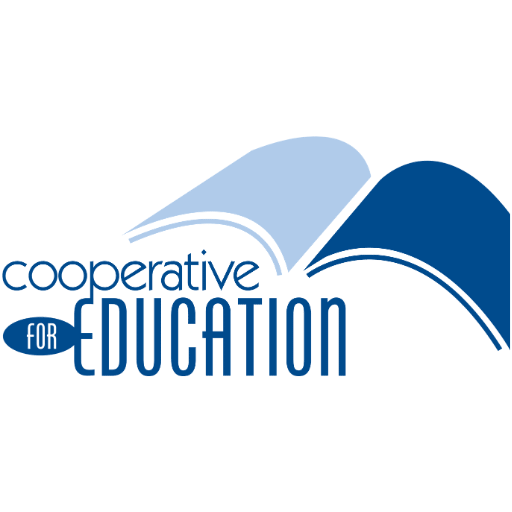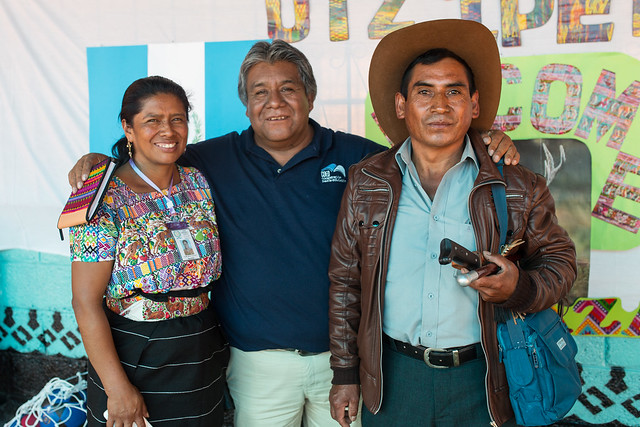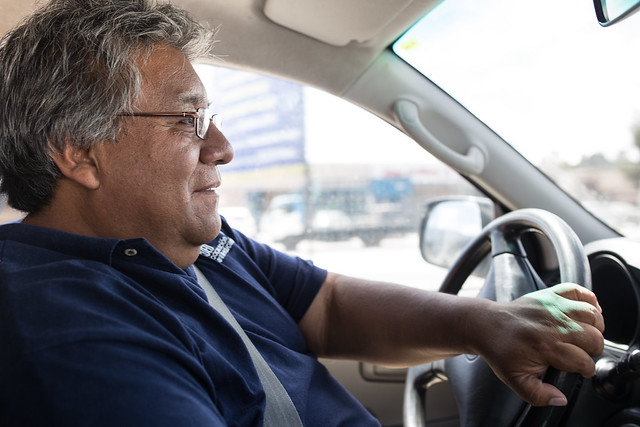While in Guatemala on a project tour this February, I got to climb into a truck with one of our Textbook Program Coordinators and ask him about his work. Augusto Bal is a jolly, Mayan grandpa of a man whose presence immediately calms and gladdens the heart. He has 23 years of experience in the field of education, many of which he spent as principal at various public schools and as the superintendent of Guatemala’s Chimaltenango department. Now, Augusto coordinates and supports Textbook Program activities such as recruitment of new schools, teacher training, book delivery, and providing support to the 193 schools already in the program. He’s passionate about the way our program inspires entire communities of people to place value on education, and permanently fills the need for textbooks through its sustainable model.
Check out what he had to say about the program and what it means to him, and remember—YOU are making all of Augusto’s wonderful work possible.
What do you most like about your job?
Lots of things. But one of the most satisfying parts of my job is explaining to parents the necessity and importance of working with the textbooks in the way that we do. In my opinion, when the parents, teachers, and students all understand this part, the program is a success. When we raise the educational quality of a school, we are also teaching the people to invest in education.
How do you help parents who have never used a textbook understand the importance of studying with them?
I like to use lots of real-life examples. The people of Guatemala are by and large agriculturalists. So I tell them, “Look, a farmer needs many tools to do his job, right? Or a carpenter—a carpenter can’t make a table or a piece of furniture with just a machete. Perhaps he could, but it would be a very poor table, wouldn’t it? He needs his saw, his brush, his hammer, everything. Or the mother in the kitchen—she doesn’t use just one pot, she has many pots—small ones, big ones, huge ones—because they serve her work. So just like the mother, the farmer, and the carpenter need many tools, the student also needs his tools in order to work.”
In Guatemala, we normally say: if you have a pencil and notebook, that’s sufficient. But it’s not! It’s as if we gave the carpenter just a machete and wood and asked him to make a piece of furniture—it would be a poorly crafted piece. So while the student can learn something with just a pencil and notebook, it helps him immeasurably to have his resource for support, his book. If we want to have good students, who become good professionals, we must support them with this resource.
Parents are also asked to pay a small monthly fee to make the Textbook Program at their school sustainable. How do you convince them that this cost is worthwhile?
We tell them that the project is like a seed that we’re bringing them—a seed you have to care for, fertilize, so that it grows and bears fruit. The manner in which we care for the seed is by, of course, caring for the books, so that they can be used by multiple students. And the way we fertilize the seed is by making contributions so that in five years, we can reap a harvest of new books.
I also use the story of an old man who is in the field planting avocado trees when his grandson, a boy, arrives and says, “What are you doing, grandpa?” The grandfather says, “I’m planting avocado trees of course!” And the boy thinks awhile, then says, “Grandpa, I think that’s silly.” “Why?” the grandfather asks. “Because you’re old and will soon die, so you’ll never eat the avocados from these trees.” The grandfather says to him, “You’re right; I won’t eat these avocados. But I ate the avocados that my grandparents and parents planted. Now I have the duty to plant avocados so that you can eat, and your children can eat. And you have a responsibility to continue planting avocadoes so that your grandchildren can eat as well.”
This story is a great way to say: “Look, we have brought you this seed. You have to water it and fertilize it so that you continue to have books, and those that come after you will do the same, so that future generations can have books as well.”
(Psst—Don’t quite remember how our Textbook Program works? Parents pay about $1.75 per month for the children to use the textbooks and those fees are saved by the school in a revolving fund. After about five years, the school has enough money to purchase new textbooks, so generations of students can study with these tools.)
What do you think about the sustainable model of the Textbook Program?
The sustainability of our program is another thing that I love about it, because we teach people to take responsibility for the education not only of their own children, but of future generations. Many other NGOs simply give resources away, and we could do the same. I tell people: “My job would be very simple, and very easy, if I just arrived and said, Well, here are the books. Some donors bought them for you. Use them, take care of them, and that’s it. See you later.” It would be so easy! But then after five years, they would call me and say, The books have worn out!
But our program helps people learn to continue giving so that the benefits last. And that’s good. If we only gave away books, the people would be very grateful, but the problem would not be solved. It’s as if the people were hungry and we gave them Pollo Campero (a popular Latin American brand of fried chicken) one time. Was the problem of hunger ended? No, it was just abated one time. But tomorrow there will be hunger again. So we have not helped much. Yes, the people will be very grateful, but we will not have caused any real development in their lives. So for us it is a beautiful thing to teach communities to maintain their own Textbook Program. We consider it a great success when the people understand the necessity of sustainability—they become more committed to working for education.
Since here in Guatemala the mentality is, “Here comes an NGO to give us things,” many people say to us, “Oh, you must be selling books.” But it’s not a business, and we have to teach people that. “No, we’re not selling books, we’re giving you books. But we don’t want to give you more books later—we want this to be your project.”
Want to empower communities with textbooks and a passion for education?
This post was contributed by Courtney Smalley.




What a great article and tribute to Augusto Bal. He is such a modest man and gives back so much. Con mucho gusto a conocer Augusto.
Helen Anderson
Tustin -Santa Ana Rotary
Thank you, Helen! We are so proud to have him on our team. Donors like you make it possible!